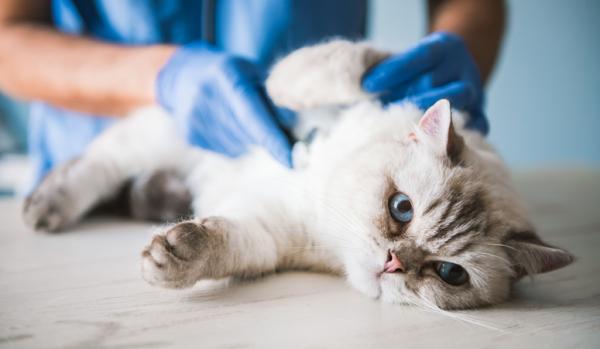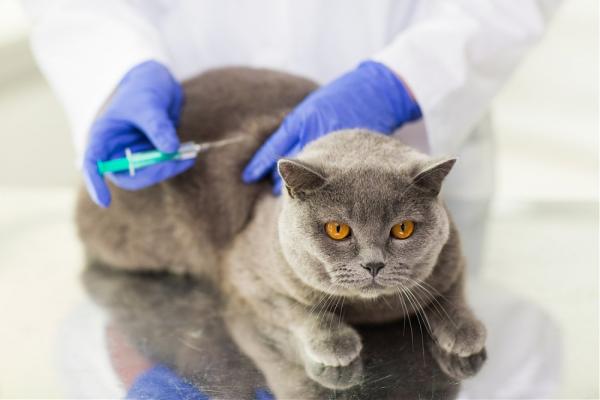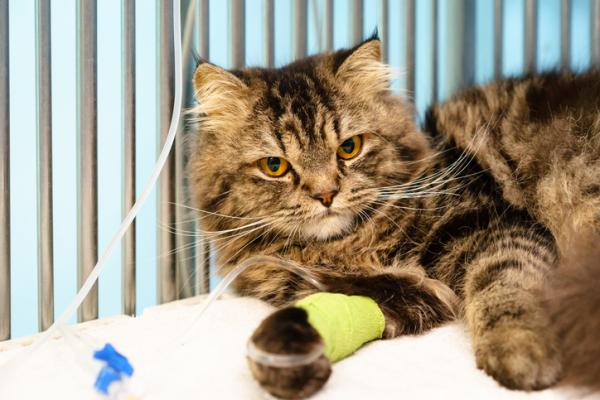Anaphylactic shock in cats – Symptoms and treatment

El anaphylactic shock in cats It is one of the most common veterinary emergencies, however, it must be treated correctly and promptly to avoid putting the feline’s health at risk. But what is an anaphylactic shock in cats? It consists of one severe allergic reaction, in which the body releases a large number of mediators of inflammation in the presence of external agents or substances that the body considers a threat.
The most common symptoms of anaphylactic shock in cats are swelling, inflammation or difficulty breathing, but there are many more, which we will mention in more detail below.
It is essential that any tutor is adequately informed about this pathology, because a quick action is key to be able to treat it effectively. Recall that the anaphylaxis It can affect any species, regardless of sex or age. Then, in, we show you everything you need to know:
Causes of anaphylactic shock in cats
Any cat is susceptible to anaphylactic shock and can occur for various reasons. One of the most common causes is cat vaccination, therefore, veterinarians recommend always supervise the animal after the injection, even before leaving the clinic.
Other causes of anaphylactic shock in cats are:
- Insect bites
- Administration of antibiotics or certain drugs
- Ingestion of certain substances or foods
However, a risk factor to consider is allergy in cats, as well as the constant exposure to allergens (substances that trigger an allergic reaction).

Symptoms of anaphylactic shock in cats
Acute allergic reactions are common in cats, although they do not have access to the outside. But also, if we let the allergy advance, then anaphylactic shock can occur in cats.
Some of the symptoms of anaphylaxis in cats are:
- At the beginning of the reaction the cat will be nervous.
- You may have hypersalivation.
- Swelling will be seen on the face, eyes, lips.
- If it has occurred due to the bite of an insect, inflammation of the affected area will be observed.
- You may have difficulty breathing, which will cause you to stretch your neck and keep your mouth open, caused by possible contraction of the bronchi, pulmonary edema.
- You may have diarrhea and vomiting.
- It lowers blood pressure, a symptom that should alert us.
- The cat will show weakness, due to collapse.
- Can occur death of the feline if it is not treated in time.
If you have observed one or more of the symptoms in your cat Do not wait to see your veterinarian, it is essential to prevent the reaction from progressing. It may happen that the animal does not show all the symptoms.
What to do if a cat has anaphylactic shock?
Anaphylactic shock is severe and progressive, so you should go immediately to the vet. Do not wait the next day or self-medicate your cat without first having seen a professional, this veterinary emergency is serious and can put at risk the life of your cat.
Likewise, it is highly recommended to avoid stress to anaphylactic shock, so we advise you to stay calm and put it in a carrier gently to go to a veterinary center urgently.
Treatment of anaphylactic shock in cats
There are no home remedies that you can put into practice to treat anaphylactic shock in your cat, however, it can be interesting to know the treatment that the veterinarian will carry out to be well informed. Likewise, we must bear in mind that the treatment will depend directly on the seriousness of the case, the patient’s age, weight, cause or location among others.
Generally, after confirming the diagnosis of the anaphylactic shock in cats, use is made of antihistamines y corticosteroids of fast action. It may also be necessary to remove the stinger if the shock is due to the sting of a bee and, in other cases, it may be required antibiotic therapy.
The patient’s supervision will be maintained for as long as necessary, until the symptoms subside and the organism returns to normal. Depending on the severity of the condition, the veterinarian may prescribe additional oral medications.
If the anaphylaxis the treatment will be more delicate, since the cat hospitalization to perform intensive care. It is likely that the veterinarian will request various tests for diagnosis, such as chest x-rays or blood tests. Intubation is also frequent to perform intravenous medication. Oxygen therapy and fluid therapy are also common. The veterinarian will tell us how long it will be necessary to hospitalize the cat before returning home.

Is it possible to prevent anaphylactic shock in cats?
While there are some general tips that we can follow, it is not always possible to prevent anaphylactic shock in cats. Still, take note of the following tips:
- Avoid exposing your cat to allergen agents.
- If your cat is allergic to the bite of some insects, go to your veterinary clinic for the specialist to prescribe a drug that you can apply in case of bite, in this way you can prevent the anaphylactic shosk progress until you can go to a center of veterinary health.
- If your cat has an intolerance or allergy to certain foods, you should consult your veterinarian the option of an elimination diet.
Remember: anaphylactic shock in cats is a serious health problem, because it can cause the death of your cat if it does not receive urgent veterinary assistance. Before the appearance of one or more symptoms mentioned in this article do not hesitate, visit the professional.
This article is merely informative, in .com we do not have the faculty to prescribe veterinary treatments or make any kind of diagnosis. We invite you to take your pet to the veterinarian in case of any type of condition or discomfort.
If you want to read more articles similar to Anaphylactic shock in cats – Symptoms and treatment, we recommend that you enter in our First Aid section.


